2023 WORLD AQUATICS CHAMPIONSHIPS
- July 23 to 30, 2023
- Fukuoka, Japan
- Marine Messe Fukuoka
- LCM (50m)
- WORLD CHAMPS WATCH PARTY – DAILY
- Meet Central
- SwimSwam Preview Index
- Entry Book
- Live Results (Omega)
In addition to ranking the top 15 female swimmers of the 2023 World Championships, SwimSwam has also decided to give out awards to the top performers of the meet. In this article, we will be highlighting who we believe are the top female swimmers, juniors, breakout performers, and relay performers of Worlds, as well as the top nation and storyline within women’s swimming. As always, our criteria are based on a combination of objective and subject factors, and if you disagree, please share your thoughts in our comments below (in a civilized manner).
Swimmer Of The Meet: Mollie O’Callaghan, Australia
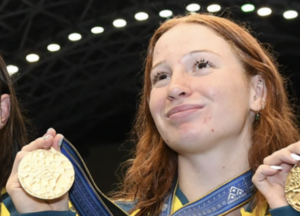
Mollie O’Callaghan courtesy of Fabio Cetti
A year ago, O’Callaghan’s role at the 2022 World Championships had just been to make up for the absences of Emma McKeon and the Campbell sisters. However, she proved this year that she was not just a replacement for those who came before her, but the one that belonged at the top.
Coming into Worlds, there were reports that O’Callaghan had suffered a knee injury a month prior. That raised concerns about her performance, and many predicted her to do worse than what she was capable of. However, in just her first swim, she blew all those concerns out of the water when she led off Australia’s world record-breaking 4×100 free relay in a 52.08, which was a 0.41-second drop from her best time and also made her the sixth-fastest swimmer in the history of the women’s 100 free. Suddenly, she was the huge favorite to take gold in the event.
Then, on day three of Worlds, O’Callaghan took down the oldest record in women’s swimming when she won gold in the 200 free. She had been trailing behind Ariarne Titmus for the first 150 meters of the race, but then ripped a 28.11 final 50 to pass her and touch the wall in a time of 1:52.85—0.13 seconds ahead of Pellegrini’s former world record mark from 2009. That same back half propelled O’Callaghan to 100 free victory two days later, as she was in seventh place at the 50-meter mark but then clocked the fastest closing split in the entire field by 0.7 seconds take the win in a time of 52.16. Her two individual titles meant that she was the first female swimmer in World Championships history to win gold in both the 100 and 200 free.
In addition, O’Callaghan also had several other relay performances that haven’t been talked about, such as her 1:53.66 leadoff leg on Australia’s world record-breaking 4×200 free relay, her 51.71 anchor on Australia’s world-record-breaking (yet again) 4×100 mixed free relay, and her 51.99 anchor on Australia’s silver medal-winning women’s medley relay. She had one of the busiest schedules out of all swimmers at these World Championships, and yet she still showed up when it counted every single time.
O’Callaghan came home from Fukuoka with five gold medals and four world records, making her by far the most decorated swimmer at these World Championships. Because of her record-breaking individual and relay performances, she is our female swimmer of the meet.
Honorable Mentions:
- Kaylee McKeown, Australia—As the only female swimmer with three individual gold medals, McKeown was probably the only swimmer who could give O’Callaghan a run for her money in the “female swimmer of the meet” category. In fact, had she broken a world record, the award probably would have gone to her. But either way, she still accomplished something historic at this World Championships, winning the 50/100/200 backstroke and becoming the first female swimmer and second overall swimmer to sweep the 50/100/200 events of a single stroke. Her winning time in the 100 back (57.53) was a championship record and just 0.08 seconds away from her world record, while her 50 back time (27.08) was a new Oceanic record and made her the third-fastest performer of all-time. And although she was off her world record in the 200 back, she still swam a 2:03.85 to win by over a second. In addition to her individual success, she also got two silver medals from leading off the women’s and mixed medley relays. The only “taint” in McKeown’s meet was her 200 IM DQ which probably cost her a medal, but other than that, she performed very well across the board and made history.
Swim Of The Meet: Mollie O’Callaghan, 200 Free
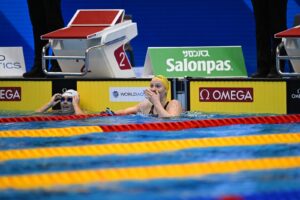
Mollie O’Callaghan World Record
photo credit Fabio Cetti
From 2008 to 2009, Italy’s Federica Pellegrini lowered the women’s 200 free world record five different times, taking it from 1:55.52 to 1:52.98. Once she stopped breaking the world record, no other woman would—for 14 straight years, the magical 1:52 was not touched.
2012 was when the first textile 1:53 happened, coming from Allison Schmitt. In 2016, Katie Ledecky followed. Then came the Tokyo Olympic year, where the rise of Ariarne Titmus occurred. Titmus posted a 1:53.09 in June 2021, which had been the second-fastest performance ever at the time. In the time following that, she produced two more sub-1:53.5 performances and became the first woman to split under 1:53 on a relay—but even after being lauded as the person destined to break Pellegrini’s elusive world record, it always escaped her. But after she broke the world record in the 400 free at these Worlds, it seemed like the time had finally come for the 200 free world record to go down.
And it did go down, but not because of Titmus. In fact, it was her younger training partner O’Callaghan who did so, posting a time of 1:52.85 to become the first woman to break 1:53 in a textile suit. And the most iconic thing about O’Callaghan’s race was that she paced it the same way that Pellegrini did, with top-notch closing speed. She had flipped in fourth at the halfway mark but then split 28.80/28.11 on the back half of her race to take gold. In fact, she had out-split Pellegrini by over half a second in her last 100. So after 14 years of Pellegrini’s 200 free world record line misleading viewers on broadcasts, O’Callaghan’s new world record line is just going to do the same in a more severe fashion.
Following years of near-misses, the oldest women’s swimming world record has finally been erased.
Honorable Mentions:
- Ariarne Titmus, 400 free—Coming into Worlds, the women’s 400 free was supposed to be a “race of the century” between Titmus, Ledecky, and Summer McIntosh. However, Titmus ended up obliterating the field, winning by over three seconds. Her final time of 3:55.38 was a 0.7-second drop from McIntosh’s old world record time of 3:56.08. Notably, this 400 free record was one that Titmus lost and got back, as she first broke it last May, got it taken away from her by McIntosh this March, and then re-broke it at Worlds.
- Ruta Meilutyte, 50 breast—Like Titmus, the world record that Meilutyte set was one that she once had, but then it was taken away from her. She first broke the 50-breast world record with a time of 29.48 in 2013, but since then, both Lilly King and Benedetta Pilato have gotten under that time. Ten years later, Meilutyte came back to reclaim that world record, and she did it not once but twice. First, it was in the semi-finals, when she went 29.30 tie Pilato’s then-world record. Then, she got under that mark in finals, going 29.16. In less than 60 seconds, Meilutyte had clocked the fastest swim of all-time in an event, and she made $60,000 worth of prize money as a bonus reward.
- Sarah Sjostrom, 50 free—There were three things in particular that were impressive about Sjostrom’s 50 free world record in the semi-finals at worlds. One, she did it just 17 minutes after winning gold in the 50 fly. Two, she was 29 years old when she set that world record, which shows incredible longevity considering that she set her first world record at age 15. And last but not least, her mark of 23.61 is 0.39 seconds faster than any other woman has been in 2023, which is a very large margin in a 50-meter event. Those three stats should be enough to prove just how impressive of a swimmer Sjostrom is.
- Katie Ledecky, 800 free—This race doesn’t make the honorable mentions list because of Ledecky’s winning time of 8:08.87, which she had already beaten at Nationals earlier this year. It is included because it was the history that allowed Ledecky to make history in two ways. With her win in the 800 free, she became the first swimmer in history to win six-straight World titles in an event (last year, she became the first to win fifth straight, but that feat has since been matched by Sjostrom in the 50 fly). That 800 free win was also her 16th individual World Championships gold medal, which meant that she had officially surpassed Michael Phelps to become the winningest swimmer in Worlds history. Because of how symbolic the 800 free was to Ledecky’s legacy, it absolutely deserves an honorable mention in this article.
- Australia, 4×100 free relay—Australia’s old record time of 3:29.69 was already over a second faster than what any other country was capable of producing. However, the quartet of O’Callaghan, Meg Harris, Shayna Jack, and Emma McKeon managed to obliterate their nation’s former mark, combining for a time of 3:27.96 to win their race by nearly four seconds. The most bonkers stat about this record is that the four Aussies averaged a split time of 51.99, which was not beaten by any non-Aussie in the field with the exception of Marrit Steenbergen (who split 51.84). In addition, the United States’ (who were the silver medalists) fastest split of 52.28 from Kate Douglass was only 0.01 of a second faster than Harris’ 52.29, which was the slowest amongst the Australians.
Nation Of The Meet: Australia
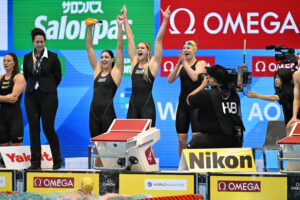
Australia by Fabio Cetti
Simply put, the Australian women won 6 out of the 17 individually contested events at this meet and medalled in 9 of them. As a result of their freestyle prowess, they also won two out of the three relays and played a big part in winning the mixed free relay. The “big three” of Ariarne Titmus, Mollie O’Callaghan, and Kaylee McKeown were responsible for the country’s individual golds on the women’s side, but swimmers like Shayna Jack, Elizabeth Dekkers, and Jenna Forrester also played a part by having big-time breakouts and upping their country’s medal tally.
In addition, the Aussies were also responsible for four out of the seven world records broken at this meet on the mixed/women’s side (women’s 200 free, women’s 400 free, women’s 4×100 free relay, women’s 4×200 free relay, mixed 4×100 free relay), as well as three out of the three relay world record broken.
Overall, the Aussies were a very well-rounded team, being strong everywhere except for breaststroke. If they continue this momentum into Paris, they will likely be the top women’s team in the world once again.
Honorable Mentions:
- United States—The American women may have gotten some flack for having an “off” meet, but they were still the nation that won the most medals (19 overall). In addition, Katie Ledecky and Kate Douglass combined for three individual golds, which made Team USA the women’s team with the second-most gold medals at Worlds. The Americans medalled in every women’s relay, taking silver in the 4×100 and 4×200 free relays, as well as gold in the medley relay.
- China—After failing to medal in any of the relays last year, the Chinese women were a major contender in all the relays this year, taking bronze in both the 4×100 and 4×200 free relays and placing fourth in the medley relay. In addition, Zhang Yufei and Cheng Yujie played a part in their country’s mixed medley relay win. Individually, Zhang led the way with three medals (one gold, one silver, and one bronze), while other swimmers like Li Bingjie, Yu Yiting, and Peng Xuwei also contributed to the medal count.
Junior Of The Meet: Summer McIntosh, Canada

Summer McIntosh by Fabio Cetti
McIntosh came into these World Championships with the massive expectation to perform lights out. It made sense—she was a sixteen-year-old who had just set two world records three months ago. And aside from a rough 400 free, where she lost her world record, added three seconds, and was off the podium, the rest of the meet was near-perfect for her.
Two days after that 400 free, McIntosh picked herself back up to win bronze in the 200 free, touching in a World Junior Record time of 1:53.65. Then, a day later, she won the 200 fly in another World Junior Record time of 2:04.06. In both events, she became the fifth-fastest performer of all time. And finally, on the last day of the meet, she won the 400 IM by over four seconds in a championship record time of 4:27.11 and anchored Canada’s medley relay to bronze with a 53.48 100 free split.
McIntosh also had to deal with some tough doubles, such as a 200 fly semi-final in the same session as her 200 free, a 4×200 free relay (where she split 1:53.97) after her 200 fly IM final, and the 400 IM and women’s medley relay finals being on the same night.
Imagine saying three years ago that a 16-year-old girl would be finishing fourth in the 400 free, medalling in the 200 free, winning world titles in the 200 fly and 400 IM, and swimming the 100 free on a relay, and yet it somehow wouldn’t be considered the best meet that she could have had. That should put in perspective just how impressive McIntosh’s meet was this year—we’ve raised our standards on her tremendously this year, but we cannot lose sight on what she’s already done now.
Note: We define a “junior” swimmer as a swimmer who is eligible to set World Junior Records.
Honorable Mentions:
- Katie Grimes, United States—After winning bronze in the 10k open water race, Grimes had a rough showing in the 1500 free, adding nearly six seconds from her Nationals time and finishing in eighth. However, on the last day of the meet, she came back to put up one of the most impressive performances from a junior when she took silver in the 400 IM. In that 400 IM race, she put up a new personal best time of 4:31.41, beating out her old PB by 0.4 seconds and getting just 0.39 seconds away from Katie Hoff’s American record Medalling in a 10k open water and a 400 IM in the same meet at 17 years old shows outwardly range, and it will be interesting to see how fast she goes if she takes on the same pool swimming/open water double next year in Paris.
- Benedetta Pilato, Italy—The 18-year-old Pilato did not qualify for the 100 breast at this year’s Worlds, but she still had a strong showing in the 50 breast despite losing her World record. In prelims, she posted a time of 29.60, which still stands as the second-fastest time in the world and her fifth-fastest time ever. She couldn’t quite back that up in finals, going 30.04, but it was still fast enough for her to earn the bronze medal. As only one of three juniors that earned individual medals at Worlds, Pilato absolutely deserves to be mentioned despite not being at her best.
Breakout Performer Of The Meet: Lauren Cox, Great Britain
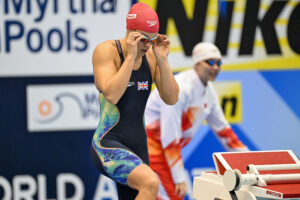
Lauren Cox by Fabio Cetti
Entering her first-ever World Championships, Cox was the tenth overall seed in the 50 back with a time of 27.61. Nobody had been expecting her to medal in a stacked field that included the likes of Regan Smith, Kaylee McKeown, Katharine Berkoff, and other heavyweights. In fact, SwimSwam hadn’t even predicted Cox to final in this race.
However, Cox proved all the doubters wrong. She set a massive best time of 27.29 in the semi-finals and then went on to lower that time to 27.20 in the finals, finishing third and picking up her first senior international individual medal. In the process, she upset several big names such as pre-meet top seed Berkoff, defending World champion Kylie Masse, and defending bronze medalist Analia Pigree. She also wasn’t super far from gold either, being just 0.12 seconds off of McKeown’s winning time.
Cox also raced the 100 back, where she missed the finals but set a personal best time of 59.79 to finish tenth overall. Headed into 2023, she had never broken a minute in the event. To cap things off, she matched her individual 100 back time leading off Great Britain’s medley relay, but her team just missed out on finals by placing ninth in prelims.
Not only did Cox win her first Worlds medal, but her medal was also the only individual medal won by a British woman (Freya Anderson and Anna Hopkin won medals as a part of Britain’s mixed free relay that took bronze).
Honorable Mentions:
- Sophie Angus, Canada—In March 2022, Angus had nearly quit swimming. She stuck with the sport with the motivation to make her nation’s medley relay at Worlds but failed to do so in 2022, adding over a second from her trials time and finishing 24th in the individual 100 breast. However, Angus had a much better showing in 2023. Though she only improved two places from her 2022 showing, she set a personal best of 1:07.34 in the 100 breast prelims, which warranted her a spot on that women’s medley relay. Angus then went on to post splits of 1:06.30 and 1:06.21 on the prelims and finals relays respectively, which were the fastest breaststroke relay splits produced by a Canadian woman since Annamay Pierse split 1:06.10 in 2009. In the finals, she was a big reason why the Canadian team picked up a bronze medal—their only relay medal at these Worlds. If Angus can continue filling the void that Canada has long had on breaststroke, the nation could be a serious threat at the Olympics if freestyler Penny Oleksiak is back and on form.
- Anastasiia Kirpichnikova, France—After switching her national affiliation from Russia to France, Kirpichnikova was eligible to compete at the World Championships and made the most out of it. She came into the women’s 1500 free as the seventh overall seed and was predicted by SwimSwam to finish eighth, but then she improved over six seconds from her entry time of 15:56.66 to go 15:48.53 in the final, placing fourth and crushing the French national record. If she continues her momentum into Paris, she could be vying for a medal at her home Olympic games. In addition, Kirpichnikova also just missed out on the finals of the 400 and 800 free, placing 14th and 9th respectively in the events.
Clutch Relay Performer Of The Meet: Shayna Jack, Australia
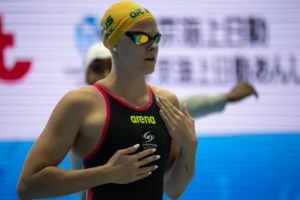
Shayna Jack (photo: Mike Lewis)
Jack had always been a strong 100 freestyler on a loaded Australian team, but this year she rose to the occasion to become the best out of them all.
First, Jack gave everyone a preview of what was to come with her 52.28 100 free leadoff leg in the prelims of the women’s 4×100 free relay, which was a 0.38-second drop from her personal best and also fast enough to have won silver individually. Then, she went on to produce splits of 51.69, 51.66, 51.53, and 51.73 across three different relays. No other woman managed to split under 51.7 at these Worlds, so the fact that Jack was able to do so three different times makes her the hands-down best relay performer at this meet.
Jack’s 51.53 was the eighth-fastest 100 free relay split of all-time, behind six of Cate Campbell‘s splits and one of Emma McKeon‘s.
To add on, Jack also swam on Australia’s 4×200 free relay, where split 1:55.63. In total, she won three golds and broke three world records (women’s 4×100 free relay, women’s 4×200 free relay, mixed 4×100 free relay), as well as a silver from the mixed medley relay.
Honorable Mentions:
- Marrit Steenbergen, Netherlands—As mentioned in the top 15 article, Steenbergen does not get enough credit where it is due. Although she left Fukuoka with zero relay medals, she still was one of the best and most consistent relay performers at the World Championships, clocking 100 free splits of 52.12, 51.84, 52.13, 52.09, 51.99, and 51.96 across the prelims and finals of three different relays. In addition, she also swam prelims and finals of the 4×200 free relay, splitting 1:56.27 in prelims and 1:55.47 in finals. Steenbergen showed almost zero visible signs of fatigue throughout her meet—even after swimming four individual events and prelims/finals of several relays (compared to many other relay swimmers from stronger countries, who only had to race finals), she still had it in her to muster up a 51-point split on the final day of the meet.
- Kate Douglass, United States—The American women had many struggles on their relays, with several swimmers not being able to replicate their flat start times. However, as the top female freestyler in the country, Douglass was the only one who stepped up time and time again. Throughout Worlds, Douglass produced 100 free splits of 52.28, 51.79, 52.42, and 52.41, with her 52.28 split notably coming approximately 20 minutes after a 200 IM semi-final. In addition, her 51.79 split was the fastest relay split that any American woman had ever recorded, and only Jack and O’Callaghan were able to better it at Worlds. In total Douglass won four relay medals—women’s medley relay gold, mixed and women’s 4×100 free relay silver, and mixed medley relay bronze.
- Lilly King, United States—King only swam on one relay, but she was arguably the reason why the American women won medley relay gold. After a rough individual showing where she missed the podium in both the 100 and 200 breast, she posted an incredible 100-breast relay swim, clocking a 1:04.93 to out-split Australia by over two seconds. Her split time was over a second faster than her flat start time and was ultimately the reason why the Americans were able to stay ahead and take the win despite Australia out-splitting the Americans on fly and free.
Storyline Of The Meet: Legends Further Cement Their Legacy

Katie Ledecky by Fabio Cetti
Sarah Sjostrom and Katie Ledecky are two of the greatest female swimmers ever. So it’s only fitting that both of them broke records previously held by Michael Phelps, the undisputed greatest swimmer of all time, at this meet.
Ledecky won her 16th individual Worlds gold medal, which had her passing Phelps as the swimmer with the most individual golds in World Championships history. Meanwhile, Sjostrom won her 21st individual Worlds medal, which surpasses Phelps’ total medal count. But both Ledecky and Sjostrom didn’t just break Phelps records at this meet, but they also expanded upon their own legacies.
After winning the 1500 free, Ledecky became the first swimmer to win five world titles in two separate events, as she also has six titles in the 800 free. Then, when she won the 800 free, she became the first to ever win six-straight World titles in an event. Ledecky’s win in the 800 free means that she continues her 13-year unbeaten streak, as she has not lost the event since July 2010.
Ledecky wasn’t just winning the 800 and 1500 free, but she was also putting up some of the fastest times in history. Her 1500 free time of 15:26.27 was the third-fastest performance ever (behind two of her own times, of course), and her 800 free (8:08.87) was the seventh-fastest performance ever. Ever since moving to train at the University of Florida, Ledecky has been getting closer and closer to her best times from when she was younger—her ability to to stay at her best for so long is the stuff of legends.
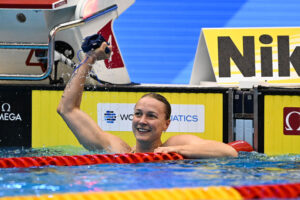
Sarah Sjostrom by Fabio Cetti
Sjostrom’s World Championships have a similar narrative. Her 50 fly World title was her fifth straight in the event, making her the only swimmer not named Ledecky to five-peat in a Worlds event. Her time of 24.74 from the semi-finals was also the fourth-fastest performance ever, which also shows how she’s able to stay at the top even after setting her 50 fly world record back in 2014.
Then, just 17 minutes after her 50 fly, Sjostrom broke the world record in the 50 free. Not only is it impressive that she took down a mark she set six years ago in 2017, but it’s also remarkable that she was able to set a world record at age 29 after setting her first one at age 15.
Both Ledecky and Sjostrom rose to the top of the swimming world as teenagers. But even over a decade later, their reign has not ended.

O’Callaghan and McIntosh had to thank Titmus for their world records, Titmus peced the race and both got the benefit of drafting even if it was mininimum from Titmus
Yes to Lauren Cox as female breakout swimmer.
Did anyone manage to count her stroke rate? She went like the flipping clappers.
Sarah Sjostrom is 8 years younger than Michael Phelps. I am wondering how many of her 4 LCM world records will be still alive in 8 years. Phelps has left with none.
Maybe this measure of greatness is more meaningful than number of medals (and not necessarily gold ones) won at World Championships.
Eight years is a long time but I’ll be surprised if she doesn’t still have at least one of the 50 world records.
Cate Campbell should have won swimmer of the meet
Storyline honorable mention goes to USA vs. Australia ongoing beef.
No arguments with this list 🙂
If we want to see another long live record from Katie Ledecky let her swim one race for the meet somewhen in season or let say just 1500 or 800 in Doha WC next year.
She made easily 8:07 having 800m race the first event at Trials
In my opinion she was 8:01- 8:02 swimmer in Rio.
Super impressed with Sarah and Katie….Doing what they are doing for over a decade…..Sarah a bit longer since she is older than Katie! And Sarah is going LTB/WR!!!!
My two favorite female swimmers. Not just because they are GOATs, but because they are stellar humans, are able to deliver under pressure, and continue to perform at the top level year after year. It is SO hard to stay competitive when swimming worldwide has improved so much! The icing on the cake is they represent the sport so well with their top-notch sports(wo)manship.